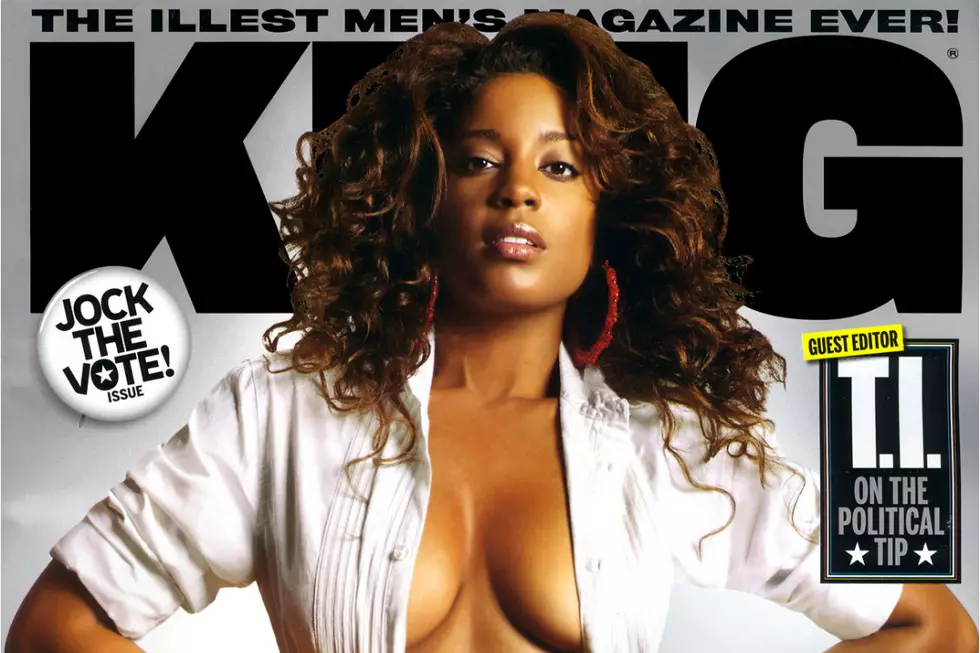Another Day At The Office
 Floyd Mayweather Jr. is hulking up.
Floyd Mayweather Jr. is hulking up.
And his opponent, nicknamed Lamont because he's a dead ringer for the Sanford and Son character, looks pretty terrified. He knows what's coming next: the knockout. Sensing victory, Mayweather shuffles to his left, now in perfect position to deliver the decisive blow. He blasts a forehand winner down the line, and the ping-pong game is over.
Game, set, match, Pretty Boy Floyd. Let the trash talking begin.
"Game over, you bum,†Mayweather, 30, says with a cackle. He then slams his paddle onto the table and launches into a victory strut, a frighteningly accurate George Jefferson impersonation. "There are three types of stars: a star, a superstar and a megastar,†he shouts loud enough to be heard throughout his Las Vegas mansion. "I'm a megastar. Watch and see.â€
Hours later, though, Mayweather's megastar status doesn't do much to clear out the V.I.P. area of Club OPM; it is the Thursday before NBA All-Star Weekend. The sweaty club kids are oblivious to Mayweather and his seven-person entourage, which consists of friends, a cousin, an adviser, some "muscle†and, strangely enough, Zab Judah. In April 2006, Mayweather defeated Judah by unanimous decision. During the 10th round, Judah connected with a low blow and rabbit punch, effectively causing a melée as both corners spilled into the ring. Judah threw punches at trainers; Mayweather coolly stood in his corner the entire time. Judah was suspended for a year.
Tonight, however, the two pugilists look like buddies, as the hyperactive Brooklyn boy hops onto a sofa and dances to Rich Boy's "Throw Some Ds.†That's a no-no. One of the club's stocky bouncers quickly admonishes him, and a humiliated Judah steps down looking for someone to blame. "You run this city,†he screams at Mayweather. "Why don't you just say something?†"Calm down, relax,†Mayweather warns. He looks embarrassed and walks away.
Leonard Ellerbe, who is Mayweather's best friend and adviser, leans over to me and says, "That's the difference between the two. You'll never catch Floyd doing anything like that.â€
But public perception says Mayweather would. Since his professional debut on Oct. 11, 1996, he has been a lightning rod for controversy, and with good reason. His run-ins with the law are infamous. His trash talk is abrasive (who can forget him calling Arturo Gatti a "blown-up club fighter†before their June 2005 bout?). Even his in-ring attire of leather shorts is borderline offensive. Yet it may all be an act. "I've got to be everything they say I am,†he says. "Who's going to believe me if I don't?â€
Well, basically everyone who watches him fight. At 37–0, Mayweather is considered the best pound-for-pound boxer in the sport. He has held titles at four different weight classes, and his back has never touched the canvas. (His one "knockdown†occurred in 2001 against Carlos Hernandez when his left glove tapped it.) You could make the argument that he's the greatest defensive fighter since Willie Pep. You could also make the argument that he's one of the all-time greats. "Floyd is on the cusp,†says boxing historian Bert Sugar. "But you have to meet and beat great [boxers]. [Sugar] Ray Robinson met and beat 22 men who are in the Boxing Hall of Fame. That, to me, is great.â€
His next fight offers that opportunity for greatness. On May 5, Mayweather faces his stiffest competition yet, future Hall of Famer Oscar de la Hoya. The fight sold out in less than three hours and is expected to top 2 million Pay Per View buys. It's the most anticipated bout since September 1999, when de la Hoya lost a controversial decision to Felix Trinidad. That fight generated 1.4 million PPV buys.
Mayweather recognizes the financial implications of the bout ("This fight will sell,†he gloats), but more importantly, he understands what he's fighting for. "Oscar's supposed to be the guy,†Mayweather says. "After I beat him, you ain't got to like me, but you will respect me.â€
 Mayweather has been scrapping for respect his entire life. His father, Floyd Sr., is a former welterweight contender who fought Sugar Ray Leonard in 1978. His current trainer, uncle Roger, won two world titles in two different weight classes during his career. He learned a basic right cross well before he mastered his ABCs but was raised in violence. When he recalls the story of watching his mother's brother shoot his father, he's unmoved. There's no awkward body language, no uneasiness in his voice, no evidence of pain.
Mayweather has been scrapping for respect his entire life. His father, Floyd Sr., is a former welterweight contender who fought Sugar Ray Leonard in 1978. His current trainer, uncle Roger, won two world titles in two different weight classes during his career. He learned a basic right cross well before he mastered his ABCs but was raised in violence. When he recalls the story of watching his mother's brother shoot his father, he's unmoved. There's no awkward body language, no uneasiness in his voice, no evidence of pain.
He's a bit more emotional when talking about shuttling between his birthplace, Grand Rapids, Michigan, and New Brunswick, New Jersey, during his parent's separation. "It was never a cake walk for me,†he says. "My father was a drug dealerâ€â€”Mayweather Sr. served five years in prison during the mid-'90s for drug trafficking—"My mother was on drugs. That's what I came up seeing, so when people ask me, ‘What fighter did you look up to?' I'm going to be honest: I looked up to the drug dealers because that's where I came from. All I had was boxing. When I was a kid, if my dad didn't take me to the gym, I would cry.â€
That kind of on-the-record openness is rare for Mayweather. He's nearly as elusive in person as he is in the ring. For example, take his interaction with 50 Cent on what was supposed to be a lazy Friday afternoon at the mansion. Mayweather immediately compliments the rapper on his new, trimmed-down look and goes into promoter mode. "Now you can get in the ring and fight your man,†he says, alluding to the Game. "I can set that Pay Per View up.â€
"He don't wanna fight me,†50 cracks as he takes his shirt off. "I'll whoop his ass.†But when the conversation shifts from banal rap beefs to intimate family matters, specifically baby-mother troubles, Mayweather shoots me a look indicating that I should turn off the tape recorder.
Ironically, Mayweather's personal troubles are no secret. In 2000, he fired his father first as his manager and then as trainer. The elder Mayweather later said, "He's a disobedient child who wants to be a gangster.†Surely, the latter was a result of Floyd Jr. hiring Rap-A-Lot Records CEO James "J.†Prince, a suspected former drug dealer, as his new manager. "Floyd's a soldier,†Prince says. "He stuck with me in the midst of all that turmoil.†During that time, however, Mayweather developed a reputation for commandeering an unruly entourage. He scoffs at this. "Just because my friends wear Timberland boots and baggy clothes…don't judge them because of that.â€
More of this story available in the June 2007 issue of KING Magazine, on newsstands now!
More From King







